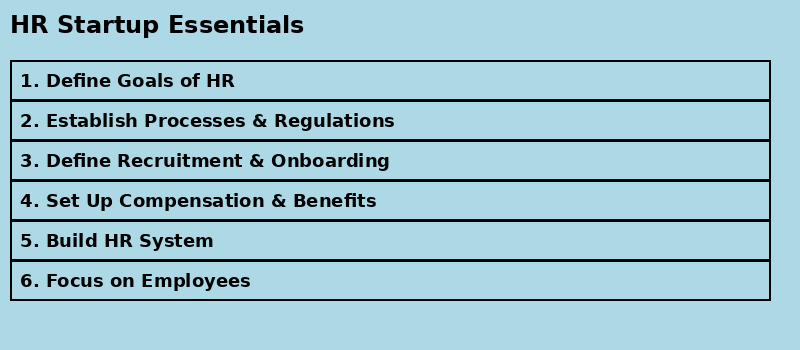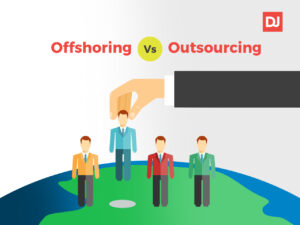The importance of having an effective and efficient HR team is often overlooked by startups. However, established companies usually benefit from having large, well-trained teams to handle their Human Resource (HR) needs, with specialists in various related fields that help these companies steadily grow and evolve.
HR teams can provide support in areas ranging from recruitment and onboarding, to handling employee relations and developing effective policies. This can help startups ensure they are in compliance with applicable laws and regulations, while also helping to create a positive and productive work environment.
In this article, we’ll explore HR in the context of startups so you’ll know how to set up an HR department in your own business properly if you choose not to outsource the HR services. Learn how to apply HR best practices to your startup and get the most out of your team.
What Is The Role Of HR In Startups?
The success of any company can be traced to the people that work on it. By interfacing with a company’s employees directly, HR departments are key contributors to their own workplace’s good functioning.
Some of the most important responsibilities of HR departments are:
Hiring And Continuously Improving Employee Conditions
This is the responsibility that most would identify with HR departments.
Hiring requires a lot of complicated steps, from creating job descriptions based on their requirements to processing and assessing candidates. It is also a part of the job that is fraught with challenges, so it’s important to have someone professional and capable dedicated to this task. This person (or team) should know the job market so they can offer conditions and benefits that will entice people to work at the company. Someone doing it as a side job just won’t cut it if you want to hire the best candidates possible.
Besides actually getting people to work for the company, another very important task is maintaining their happiness, so they’re less inclined to leave for greener pastures. Put your best foot forward: a proper onboarding is a good start, but don’t rest on your laurels. HR is there to stay in touch with your employees and provide them with the best work conditions possible. From day one, HR departments should strive to build an inclusive and motivating workplace that allows people to learn and grow.
Maintain Employee Information
Besides hiring and keeping employees happy, HR departments are responsible for keeping their information and documents updated and in order. This includes their CVs/resumes, copies of their contracts, all paperwork relating to leaves and any work-related accidents, and other relevant sensitive information.
Establishing Of Work Policies And Processes
All staff should have a knowledge base to reference when it comes to company policies and proper procedures for any common occurrence in their daily activities. HR departments are responsible for deciding, documenting, and maintaining these policies so workers can easily access and consult them when needed. Some of these include a code of conduct, employee benefits, performance assessment, online security, and learning opportunities.
Ensure Compliance With Laws And Regulations
To avoid legal complications, your company’s operations need to comply with the laws and regulations of the place where it operates. Big companies can hire legal teams to take care of these issues, but when it comes to startups, this responsibility will usually fall on the HR department.
Establish A Company’s Growth Plans
Besides hiring people needed at any particular moment, HR teams are also responsible for looking into the future and predicting the needs of an ever-growing business. HR strategy for startups includes creating hiring plans and preparing the expansion of (or even automating) their other already existing processes.
What Are The 7 HR Basics?
HR for small businesses operates on the same principles as any other corporation, so it’s important to know them.
Let’s review the 7 basic principles for HR in startups:
1. Recruitment And Selection
Candidate recruitment and selection is the most prominent element of HR and the one people most often associate with the job.
This part of the work entails listing the job on job boards and assessing and screening all candidates. These can take the form of interviews and, in the case of IT jobs, coding challenges.
Recruitment is often seasonal, but when starting, small businesses make it a fundamental part of their HR daily checklist.
2. Performance Management
Employees will have certain responsibilities based on their job. Performance management is a process by which HR and team managers work together to evaluate and grade the performance of employees over a period of time (usually a year). This is done for the benefit of management, who get to know if their employees are performing according to expectations, and the employees, who get feedback on their work and are given possible avenues of growth.
3. Learning And Development
HR departments are responsible for providing employees with opportunities to learn and adapt to new realities within their field of work. This not only prepares them for new technology or know-how in their field, but also empowers them with new knowledge that they can use to benefit the company and climb through the ranks.
4. Succession Planning
Succession planning is a contingency that HR departments should have in case anyone in the company in a position of responsibility suddenly leaves. Responsible HR departments should have several candidates lined up to be interviewed and possibly hired in case of sudden changes.
5. Compensation And Benefits
Fair compensation is imperative if you want to keep your employees happy and motivated. HR departments should have in mind how much everyone should earn based on market research and also performance within the company. You’ll want to motivate the employees that bring the most value to the company, but make sure you pay attention to everyone else in the process!
Another key consideration is giving your employees benefits that they care about. On-site perks are good if the person is working there, but remote workers will never get to use them. Make sure you tailor your workers’ benefits to what they need.
6. Human Resources Information Systems (HRIS)
HRIS is a collection of digital tools that helps HR departments keep track of all previous basics discussed. Examples of these tools are Applicant Tracking Systems (ATS) for Recruitment And Selection, Performance Management Systems for Performance Management, and Learning Management Systems (LMS) for Learning And Development.
7. HR Data And Analytics
Current HRIS systems have data gathering and analysis tools that can help HR departments make better decisions. They can make custom reports that track Key Performance Indicators (KPI) of many of the systems set up in a company.
By comparing these reports over time, HR departments can infer solutions to current problems and shortcomings, and find new opportunities for growth and improvement for the company and its employees.
The HR Checklist For Startups – 6 Steps to Follow

Now that you know what an HR department is supposed to do and why, another question pops up: what is the HR strategy for a startup?
Here’s a step-by-step human resources checklist for small businesses and startups to get your HR department going:
1. Define The Goals Of The HR Department
Figuring out the HR operating model for startups can be hard at first.
When establishing an HR department, evaluate what systems are already in place and how they can be improved. This needs to be discussed with management, as they will provide insight into their current state and what needs to change regarding processes and employee management.
From there, priorities should be given to the needed changes based on the company’s overall goals.
Is the lack of employees hurting team productivity? Are the systems for employee management in place insufficient and setting the company back?
Find the biggest roadblocks to the company’s growth so you can start defining strategies to overcome them.
2. Establish Your Processes and Regulations
Company policy is very important to establish early on, and its maintenance is a key responsibility of HR in a startup. Documentation about these policies should be prepared and updated as needed. Examples of important documentation to have early on include:
- Employee contract template
- Freelance contract template
- NDA template
- Remote work policy
- Work hours and overtime policy
- Health and safety policy
- Temporary leave policy (paternity/maternity, sickness, etc.)
- Holidays/vacation/paid time off policy
If you still need to get documents of this nature, several resources online already provide templates to start from, so you won’t have to do everything from scratch.
Keep these documents in an easy-to-access place so all employees can stay updated on the company’s policies. They will only follow the rules if they know the rules to begin with. Also, ensure sensitive documents pertaining to your employees are kept in a secure location.
3. Define A Recruitment And Onboarding Process
Both recruitment and onboarding are two very important processes to nail early. You’ll want to put your best foot forward and give your candidates reason to work for you. This is crucial if you want to find the best people to fill the positions at your company.
When recruiting, make sure you define:
- What kind of information should recruiters include in job descriptions
- Where job openings should be posted
- How you should contact possible candidates or, conversely, how you want your candidates to contact you
- What documents you expect from your candidates (CV/resume, portfolio, etc)
- What documents the company is expected to give the candidate
- How many stages the recruitment process takes
- How you’ll assess your candidates (be it interviews, coding challenges, etc.)
- The people who have the final word in deciding who gets to join the company
And when onboarding:
- What resources need to be created for new employees (company e-mail, access to company’s systems, etc)
- What welcome package new employees receive (documents with relevant information, etc)
- Who gets to onboard new employees and what they should do to make them feel welcome
Defining all these will give you a solid foundation to have an established process and find the best people to come work for you.
4. Set Up Your Compensation and Benefits
HR should have a grasp on what is currently being offered for employee remuneration. This will include salaries, health insurance, paid leaves, etc. You can start thinking of perks and other benefits after you’ve set these essential compensations in place.
Payments are usually handled automatically through a Payroll Management System, so find one that fits your company’s needs. Figure out any legal requirements your employees have that could potentially disrupt their payroll process. This is especially important if your team is worldwide/remote, as laws will change depending on the location of your employees.
5. Build Your HR System
Besides payroll automation (if you’re doing it in-house), other systems should be implemented so you can manage your employees more efficiently. Build your HR tech stack with the help of an HRIS and all its components, making sure to use tools that work well together.
6. Focus on Your Employees
Startups are usually focused on making a product and selling it to investors or customers. But remember, you don’t get to have a product if you don’t have the right people there to develop it (or any at all!).
HR should always focus on keeping current employees happy while finding new ones who fit the company’s culture. Policies established at the start may not work after some time has passed, and that’s OK. HR is there to reevaluate and help change them to accommodate both the needs of your business and your employees.
Maintain a constant communication channel with each of your employees. Give them space to voice their concerns, and provide ways for them to give honest, anonymous feedback if needed. By addressing these concerns promptly, you’ll build a healthy workplace where people will feel valued and happy.
As a last note, also provide growth opportunities for your employees, such as learning and accruing more responsibilities. This is a critical process to implement, as it is how you attract top talent.
Need To Come Up With An HR Plan For A Startup Company? Distantjob Is Here To Help!
When it comes to HR, startups need to establish their processes early, so they have the best shot at landing and maintaining the best employees. Now you know the HR operating model for startups and can put it into practice in your own business. It’s very important to establish the best HR practices for startups early on so you can grow your company faster and get the best people working for you.
If you’re struggling with HRM in your own company, or just want a partner to help you out with it, you’ve come to the right place. DistantJob offers a comprehensive HR package that helps companies get the right footing and the people they need.
We’re a company with more than ten years of experience in remote recruitment, specializing in tech industries. We have a vast array of expert developers at our disposal and can get your positions filled in 2 weeks with a person that mirrors your company culture.
Interested? Reach out to know more about our HR services!





